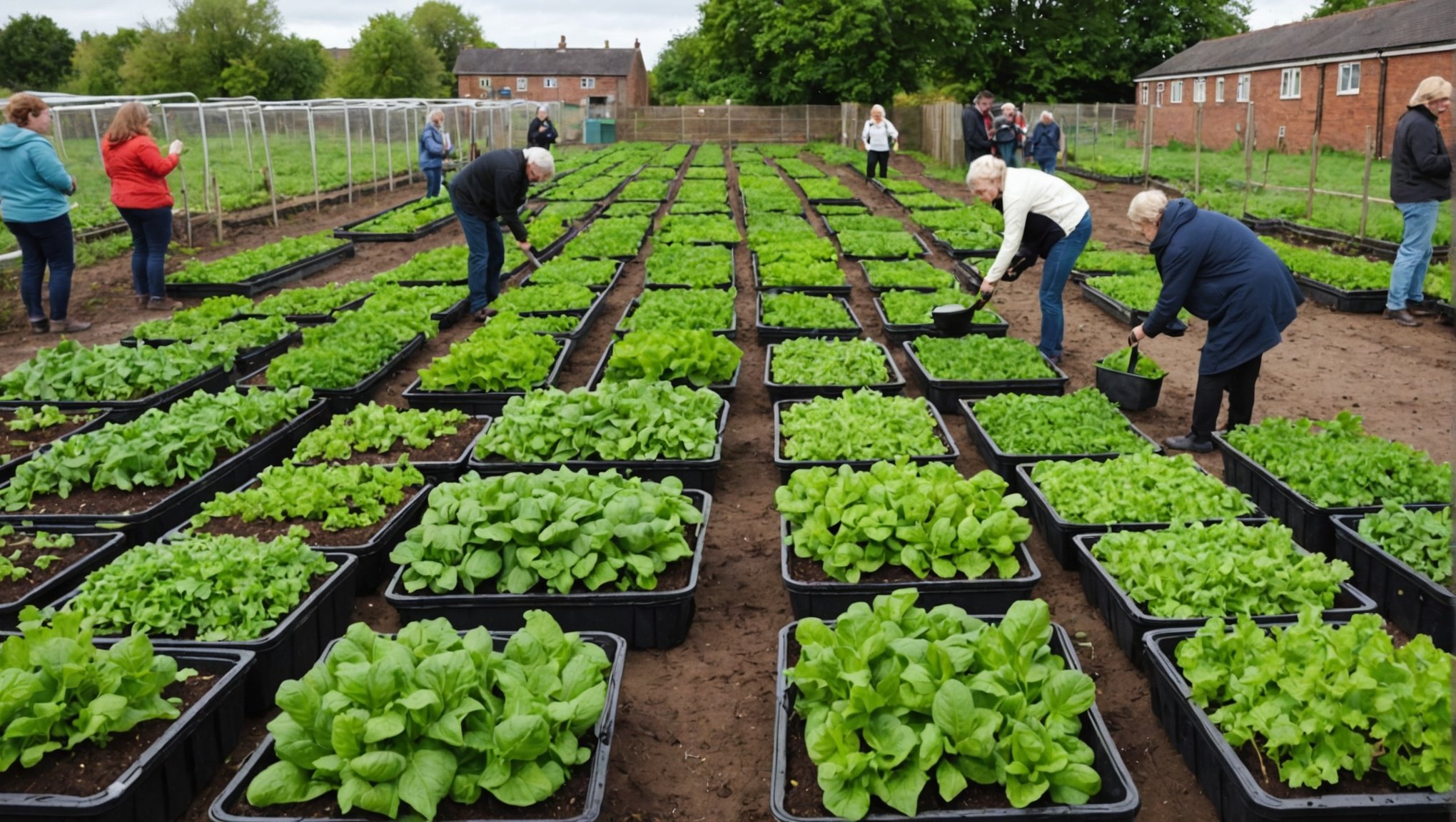Transforming Food Deserts: The Power of Urban Farming in the UK to Urban Farming in the UK
In the heart of the United Kingdom, a revolution is underway, transforming urban landscapes and addressing one of the most pressing issues of our time: food deserts. Urban farming, once a niche concept, has evolved into a robust movement that is not only providing fresh produce to thousands of households but also empowering local communities and fostering a more sustainable future.
What are Food Deserts and Why Do They Matter?
Food deserts are areas where it is difficult to buy affordable or good-quality fresh food. These areas are often characterized by low income, limited access to grocery stores, and a high reliance on convenience stores and fast food outlets. The impact of food deserts is multifaceted, contributing to food insecurity, poor health outcomes, and a lack of community cohesion.
Also to read : Top Strategies for UK Households to Conserve Energy This Winter
| Characteristics of Food Deserts | Impact on Communities |
|---|---|
| Limited access to fresh produce | Poor health outcomes |
| High reliance on convenience stores | Food insecurity |
| Low income | Limited community cohesion |
| Lack of grocery stores | High rates of obesity and diabetes |
Urban Farming: A Solution to Food Deserts
Urban farming is emerging as a powerful solution to the problem of food deserts. By transforming urban spaces into thriving green communities, urban farming initiatives are providing fresh, locally grown produce to areas that need it most.
Examples of Urban Farming Initiatives in the UK
-
Farm Urban: Based in the UK, Farm Urban has been engaging communities in sustainable food solutions since 2013. They use vertical farming techniques to grow a variety of crops, ensuring year-round production and reducing the reliance on external food sources[4].
Also read : Empowering UK Students: Innovative Strategies for Embedding Climate Change Education in School Curriculums
-
New Community Woodland for South Hams: This initiative in the UK works with local schools and community groups to tackle climate change and build resilient communities. By treating their land as a commons and reconnecting people with their food sources, they are fostering a sense of community and promoting sustainable agriculture practices[1].
How Urban Farming Addresses Climate Change
Urban farming is not just about providing fresh food; it is also a critical component in the fight against climate change.
Reducing GHG Emissions
Urban farming reduces greenhouse gas (GHG) emissions in several ways:
- Local Production: By growing food locally, urban farming minimizes the need for long-distance transportation, which is a significant source of GHG emissions.
- Sustainable Practices: Techniques like vertical farming, aquaponics, and organic farming promote soil health, reduce the use of synthetic fertilizers, and conserve water, all of which contribute to lower emissions.
Adaptation and Mitigation
Urban farming also plays a role in both adaptation and mitigation strategies for climate change:
- Adaptation: Urban farms can adapt to changing climate conditions by using advanced climate control technologies and innovative farming techniques such as agrivoltaics, which combine solar panels with crop production[4].
- Mitigation: By promoting regenerative agriculture practices, urban farming helps in sequestering carbon in the soil, reducing land degradation, and enhancing biodiversity.
Impact on Local Communities
The impact of urban farming on local communities is profound and multifaceted.
Food Security
Urban farming directly addresses food insecurity by providing fresh, nutritious produce to areas that were previously underserved. For example, initiatives like City Sprouts in Singapore and Fresh Roots in Ohio are transforming food deserts into fertile farms, ensuring that thousands of households have access to healthy food[2][5].
Economic Benefits
Urban farming also has significant economic benefits:
- Income Generation: By creating jobs and income opportunities in urban agriculture, these initiatives help in boosting the local economy.
- Reduced Food Prices: Local production reduces the costs associated with transportation and distribution, making fresh produce more affordable for low-income communities.
Community Cohesion
Urban farming fosters community cohesion by engaging residents in the process of growing and maintaining their own food sources. This not only builds confidence and a sense of ownership but also promotes social interaction and community pride.
Practical Insights and Actionable Advice
For those interested in starting or supporting urban farming initiatives, here are some practical insights and actionable advice:
Starting an Urban Farm
- Assess Your Space: Evaluate the available space and determine the best farming method (e.g., vertical farming, container gardening).
- Engage the Community: Involve local residents in the planning and execution process to build support and ensure sustainability.
- Use Sustainable Practices: Adopt regenerative agriculture techniques to enhance soil health, reduce emissions, and promote biodiversity.
Supporting Urban Farming Initiatives
- Volunteer: Many urban farms rely on volunteers to help with planting, harvesting, and educational programs.
- Buy Local: Support local farmers by purchasing their produce, which helps in sustaining the initiative.
- Advocate: Raise awareness about the benefits of urban farming and advocate for policies that support these initiatives.
Data and Statistics: The Evidence Behind Urban Farming
Here is a comparative table highlighting the impact of urban farming on various aspects of food systems and community well-being:
| Aspect | Before Urban Farming | After Urban Farming |
|---|---|---|
| Access to Fresh Produce | Low | High |
| Food Prices | High | Low |
| GHG Emissions | High | Low |
| Community Engagement | Low | High |
| Food Security | Low | High |
| Local Income Generation | Low | High |
Quotes from Key Stakeholders
-
“Urban farming is not just about growing food; it’s about building resilient communities and fostering a sense of ownership and pride among residents.” – Simone Lim, Founder of City Sprouts[2].
-
“By integrating traditional wisdom with modern frameworks, we are fostering community self-determination and food sovereignty for future generations.” – Moloka’i Land Back Movement[1].
-
“Urban farming is crucial for addressing future food demands and educating the next generation about sustainability and the origins of their food.” – Nic Goh, Urban Farmer in Singapore[2].
Urban farming in the UK is a beacon of hope for transforming food deserts into thriving, sustainable communities. By addressing food insecurity, reducing GHG emissions, and fostering community cohesion, these initiatives are paving the way for a healthier, more resilient future. As we move forward, it is essential to continue supporting and expanding these efforts, ensuring that everyone has access to fresh, nutritious food and the opportunity to thrive in a sustainable environment.










